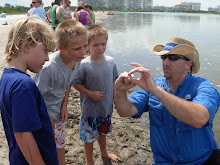Wendy Quigley, the Outreach Coordinator for FWRI started the evening off talking about the impacts of last season's cold spell on Florida's snook population. If you haven't already heard, FWC has decided to keep the west coast snook fishery closed until Sept 2011 due to being more severely impacted than Florida's east coast fishery. Anglers on the east coast will be able to target snook from September 17th until December 15th, and then their season will also be closed until next September. An important point Wendy made is that the state's snook cold kill assessment came not so much from the "dead fish counts" reported all over the state last winter, but more from on-going monitoring programs the state already has had in place such as the Marine Recreational Fisheries Statistics Survey, Everglades National Park’s recreational creel survey, and snook acoustic tagging data.
 Wendy also mentioned that since the snook season will be closed for west coast anglers, FWC is allowing anglers to get a refund for their snook stamp. To learn about the details click here. (Keep in mind, however, that the funds from the purchase of the snook stamp go directly towards research on Florida's snook fishery. To learn more about how these funds are used click here.)
Wendy also mentioned that since the snook season will be closed for west coast anglers, FWC is allowing anglers to get a refund for their snook stamp. To learn about the details click here. (Keep in mind, however, that the funds from the purchase of the snook stamp go directly towards research on Florida's snook fishery. To learn more about how these funds are used click here.)Next, Ron Taylor, the state's lead snook biologist gave an amazing presentation on the life history and biology of snook. If there is anyone in the state of Florida who knows about snook, it is Ron. I am still extremely grateful he agreed to come down and do the seminar. I think what struck me the most is that even even after studying snook for 35 years he said there is still so much they do not know about snook!!
Instead of trying to give a complete overview of his presentation I thought I'd leave you with some of the interesting facts Ron told us about snook. (keep in mind this is only some of what Ron talked about!)
- There are actually 5, not 4 species of snook in South Florida (Common, Tarpon, Small-scale Fat, Swordspine, and the Large-scale Fat)
- There is more genetic diversity among the Atlantic coast snook stock than on the Gulf coast
Snook on the Atlantic coast grow significantly faster and older than snook on the Gulf coast- Spawning season on the Gulf coast is continuous from April through September while on the Atlantic coasts its from May through October
- Females can spawn every 2 days during this time and on average, the number of eggs released is 1.25 million per batch! That's a lot of snook eggs!!!
- Fertilized eggs require at least 27 parts per thousand salinity to float (they can spawn in fresh water but eggs won't be able to float and survive!)
- Peak spawning occurs between 4PM and 9PM (lunar cycle and current are major factors)
- All snook start off as males and as they get older change to female (the reversal process takes less than 90 days to complete). Most males in the population change to female by age 12, but not always. Some of the largest snook Ron and his group tagged were actually males)
- Freshwater and wetland resources are critical to the protection of Florida's snook populations
- Most snook in the population are approximately 7 years of age and less than 32" total length.
- Gulf coast snook make more local movements within the same estuary while Atlantic coast snook make more extensive trips up and down the coast line.
Finally, I can't forget Captain Jesse from Mad Snookin' Charters who shared with the audience what he's seen on the water since the cold spell, some of his techniques for fishing for snook, and more importantly proper practices for handling and releasing snook. It was very apparent Jesse "loves" his snook fishing and does everything in his power to ensure the fish he catches and releases survive and thrive. (for more details on proper catch and release practices click here.) Unfortunately his report on snook fishing in the the 10,000 Islands areas was not as promising as it has been in the past due, in large part, to last season's cold spell and perhaps other unknown factors.
Thank you to all the speakers for making the event successful and to attendees who were able to make it!!








No comments:
Post a Comment